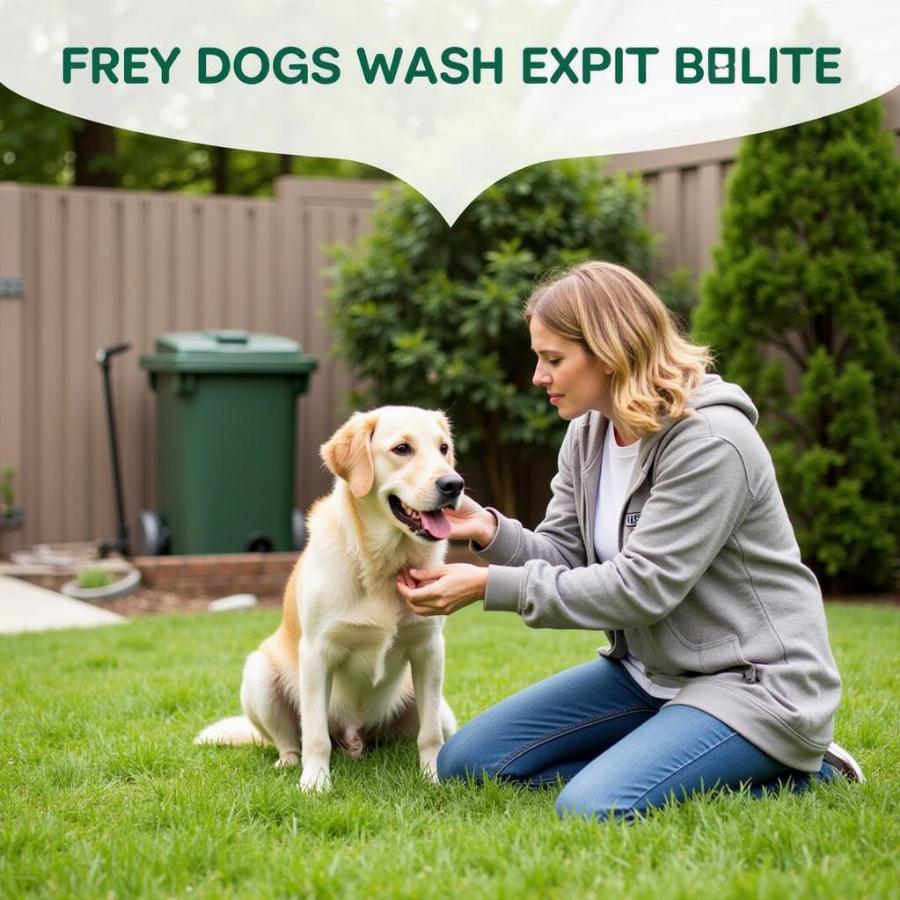Bug spray and the safety of your furry friend – two things that often come to mind during the warmer months. Keeping pests away is important for both you and your dog, but using the wrong products can have serious consequences for your canine companion. Understanding which bug sprays are safe, and which to avoid, is crucial for responsible dog ownership.
Decoding Bug Spray Ingredients: What’s Safe and What’s Not
When choosing a bug spray for your dog, understanding the ingredients is paramount. DEET, a common ingredient in many human insect repellents, is toxic to dogs. Even small amounts can cause neurological problems, including tremors and seizures. Similarly, permethrin, found in some flea and tick products for dogs, can be deadly to cats and should be used with caution even on dogs, following label instructions precisely. Safe alternatives include natural repellents containing essential oils like citronella, lemongrass, and cedarwood. These offer a gentler approach to pest control, though their effectiveness can vary.
Protecting Your Pup: Choosing the Right Bug Spray
The best bug sprays for dogs are specifically formulated for canine use. Look for products that clearly state “safe for dogs” on the label. Always follow the manufacturer’s instructions carefully, paying attention to dosage and application frequency. Never use human bug spray on your dog. If you’re unsure which product to choose, consult your veterinarian for recommendations. They can advise you on the safest and most effective options based on your dog’s breed, age, and health condition.
Is it okay to use human bug spray on dogs?
Absolutely not. Human bug sprays often contain DEET and other chemicals toxic to dogs. Even a small amount can cause serious health issues.
Can I use natural bug spray on my dog?
Yes, natural bug sprays containing essential oils like citronella and lemongrass can be a safer alternative. However, always test a small area first to check for any allergic reactions.
Beyond Bug Spray: Other Pest Control Measures
 Các biện pháp phòng ngừa côn trùng cho chó
Các biện pháp phòng ngừa côn trùng cho chó
While bug spray can be helpful, it’s not the only way to protect your dog from pests. Regular grooming, including bathing and brushing, can help remove fleas and ticks. Maintaining a clean environment, both indoors and outdoors, is crucial. This includes regularly cleaning your dog’s bedding and vacuuming your home. Keeping your yard free of standing water can also minimize mosquito breeding grounds. For more information on dealing with specific pests like bed bugs, see our article on do bed bugs get on dogs.
Natural Bug Repellent Recipes for Dogs
If you prefer a DIY approach, you can create your own natural bug repellent for your dog using essential oils. However, it’s crucial to dilute the oils properly to avoid skin irritation. Consult with a holistic veterinarian for safe and effective recipes. You can also learn more about how different insects affect dogs in our article pictures of bug bites on dogs.
Bug Bites: Identifying and Treating Reactions
Even with preventative measures, bug bites can still happen. Knowing how to identify and treat them is important. Common signs of a bug bite include redness, swelling, and itching. If you notice any of these symptoms, consult your vet. For a visual guide to identifying bug bites, check out our resource on bug bites dogs pictures.
Dr. Emily Carter, DVM, a renowned veterinary dermatologist, advises, “Always prioritize prevention. Regular check-ups, appropriate flea and tick medication, and a clean environment are essential for protecting your dog from pests.”
Dr. David Miller, a leading expert in canine health, adds, “When using any bug spray on your dog, always follow the manufacturer’s instructions carefully. If you have any concerns, consult with your veterinarian.”
Conclusion
Protecting your dog from pests is a vital part of responsible pet ownership. Choosing the right bug spray, along with other preventative measures, can ensure your furry friend stays safe and healthy. Remember, bug spray and dogs can coexist safely with careful product selection and responsible application. Always consult your vet if you have any questions or concerns.
FAQ
- What should I do if my dog licks bug spray?
- Can I use citronella candles around my dog?
- Are there any dog breeds more susceptible to bug bites?
- What are the signs of a severe allergic reaction to a bug bite?
- How often should I apply bug spray to my dog?
- Can flea and tick collars protect against other insects?
- What are some home remedies for treating bug bites on dogs?
Beaut Dogs is your go-to resource for all things dog-related, providing reliable and expert information on the fascinating world of canines. From breed-specific care to health and nutrition, we’ve got you covered. When you need assistance, don’t hesitate to contact us via Email at [email protected] to receive detailed and accurate answers from Beaut Dogs. Visit us at https://beautdogs.com to learn more.